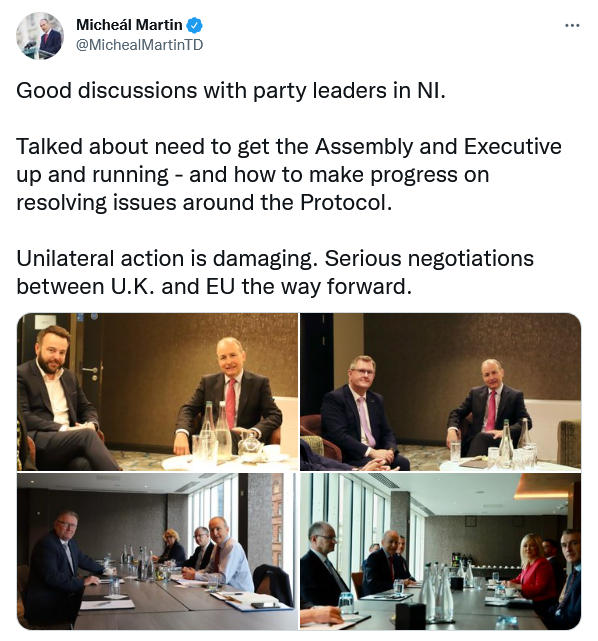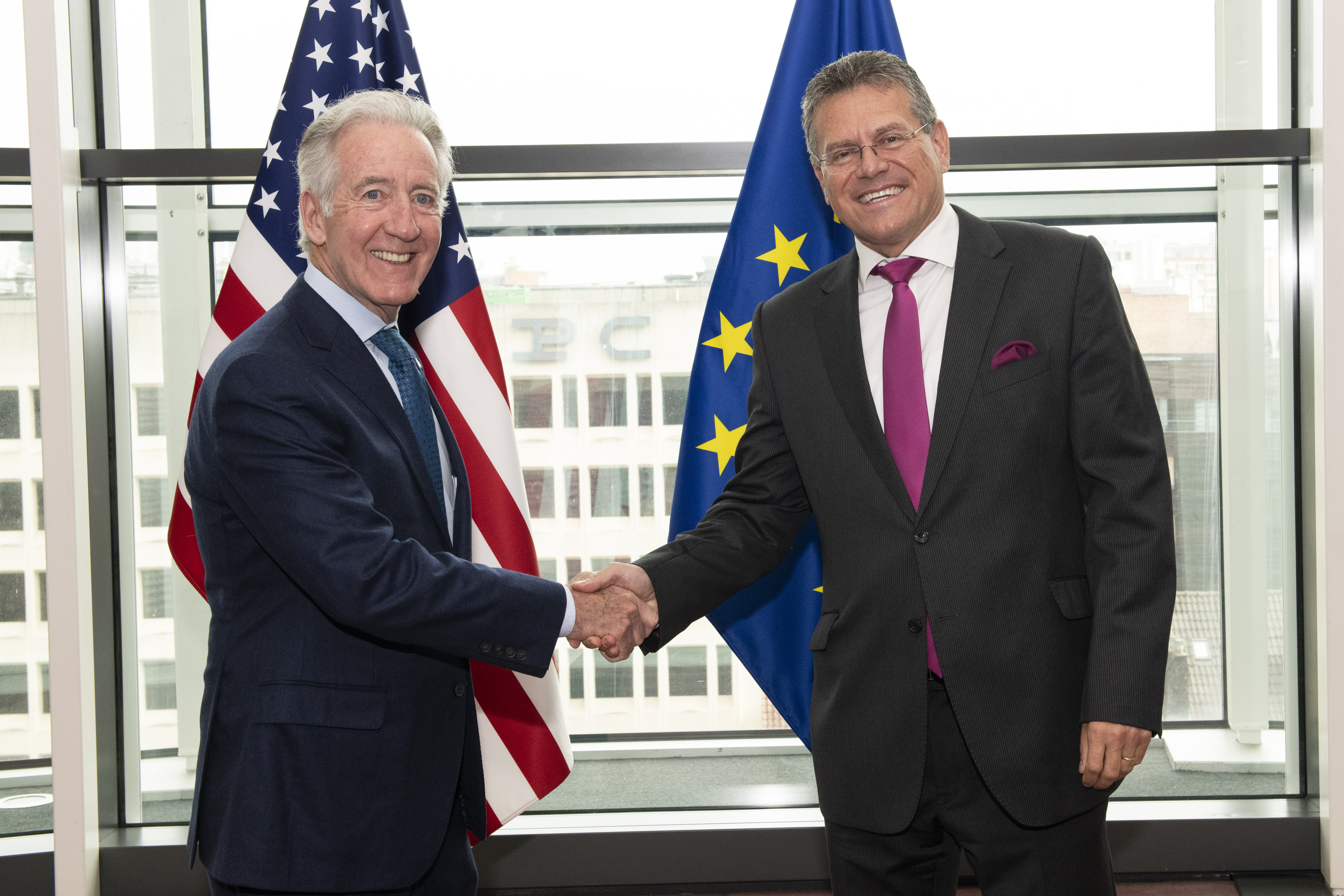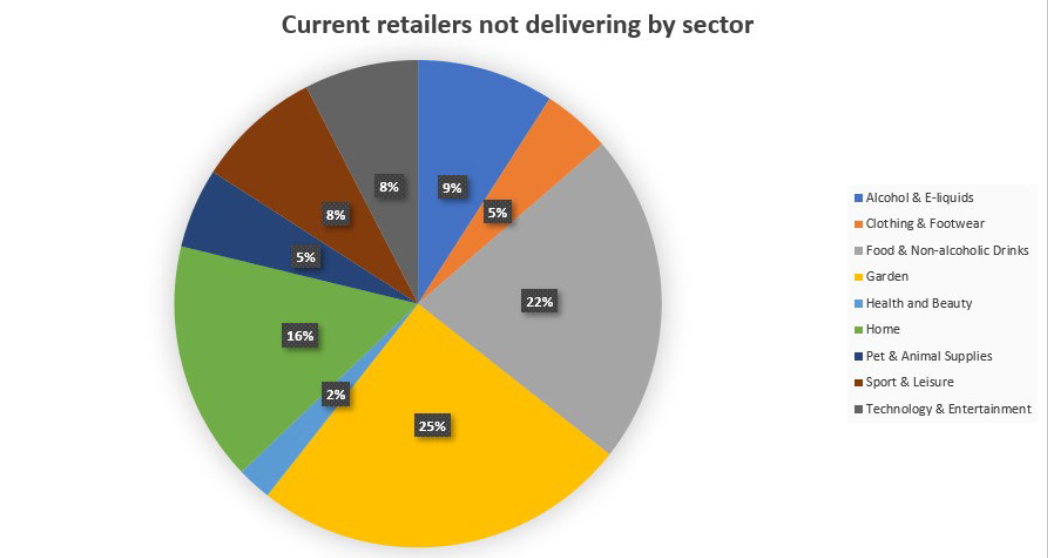Brexit & Beyond Newsletter
23 May 2022

Welcome to the 23 May 2022 Brexit & Beyond newsletter
Discussions and meetings about the Protocol on Ireland/Northern Ireland continue. The Taoiseach visited Northern Ireland last week, and a delegation from the US Congress will visit later this week. This week’s newsletter also covers retained EU law and devolution, the number of GB retailers not delivering to Northern Ireland, the impact of Brexit on rural affairs, and scrutiny of trade deals in the UK Parliament.
Protocol engagements
Ireland’s Taoiseach Micheál Martin visited Northern Ireland last week and held talks with the main political parties. He said issues with the Protocol could be resolved through “substantive, serious negotiations between the European Union and the UK Government". DUP leader Sir Jeffrey Donaldson called his meeting with the Taoiseach “useful” but regarding the Protocol, said, “We are not interested in a sticking plaster approach, or tinkering around the edges, it has to be fundamental change which respects Northern Ireland's place within the UK internal market and nothing short of that will suffice.”

Taoiseach Micheál Martin with party leaders in Northern Ireland | Source: Twitter
UK Foreign Minister Liz Truss met her Irish counterpart Simon Coveney in Turin on Friday. Truss tweeted, “We remain open to a negotiated solution but we cannot allow any more drift.” Coveney tweeted, “I made clear Ireland’s opposition to the U.K. breaching international law. The UK needs to get back to talks with the EU.”
The Commons Library has published an updated briefing paper on the Protocol on Ireland/Northern Ireland, including EU-UK negotiations, Article 16, international law, and information on the UK Government’s announcement to change the Protocol.
US politicians intervene in the Protocol dispute
A delegation from the US Congress is in Europe and has held meetings with the EU, and the UK Government. On Thursday and Friday, the group will visit Northern Ireland. The delegation, led by Chairman of the Ways and Means Committee, Congressman Richard Neal, met with UK Foreign Secretary Liz Truss on Saturday. Neal "urged good faith negotiations with the EU to find durable solutions for post-Brexit trade between Great Britain and Northern Ireland". The delegation also met the UK International Trade Secretary Anne-Marie Trevelyan and Labour leader Sir Keir Starmer. In Brussels, they met with European Commission Vice-President Maroš Šefčovič on Friday. Šefčovič tweeted, “We're equally committed to protecting the Good Friday (Belfast) Agreement: joint solutions implementing the Protocol are the only way to do so.”

Congressman Richard Neal and European Commission Vice-President Maroš Šefcovic | Source: European Union, 2022
Earlier last week, Speaker of the United States House of Representatives Nancy Pelosi released a statement of support for the Protocol on Ireland/Northern Ireland, saying “if the United Kingdom chooses to undermine the Good Friday Accords, the Congress cannot and will not support a bilateral free trade agreement with the United Kingdom.” Unionist politicians responded, with DUP leader Sir Jeffrey Donaldson calling Pelosi’s statement “entirely unhelpful”. UUP leader Doug Beattie said the comments were “not just deeply regrettable and misinformed, but are completely wrong. The Protocol does not protect the Belfast Agreement, it does the exact opposite by undermining East-West relationships; an important strand of the Belfast Agreement.” The Telegraph reports remarks from Northern Ireland Office Minister Conor Burns, who said “There can be no connection between that [a Free Trade Agreement with the US] and doing the right thing for Northern Ireland.”
Perspectives on the Protocol
Ireland’s Tánaiste Leo Varadkar writes in the Guardian, “The EU will continue talking to the UK for as long as the UK is willing to engage. But negotiating with a partner that is willing to break agreements and change its mind on what it wants is not easy. The EU’s flexibility and good faith have not been reciprocated by the UK government. This is breeding mistrust in EU capitals.”
British Ambassador to Ireland Paul Johnston told journalists on Friday that the UK Government’s view is that “times have changed and we think that this in principle refusal to reopen the [EU’s negotiating] mandate is a point we’re bumping up against.” He said the UK wanted a version of the Protocol which was “more sustainable, has broader support and doesn’t make the protocol a wedge issue in Northern Ireland politics and enables us to go forward.”
The Independent Commission on UK-EU relations, which examines the impacts of the Brexit agreements and includes leaders from the business world, trade unions, journalism, academia and civil society has said, “The Government’s intention to unilaterally suspend parts of the Northern Ireland Protocol is fraught with risk for Northern Ireland and the UK. Any necessary changes to the Protocol and Trade and Cooperation Agreement (TCA) should instead be agreed through negotiation and the rebuilding of trust.” It states, “Both the Protocol and TCA could and should be amended to improve outcomes for the people of Great Britain and Northern Ireland, removing unintended consequences as far as possible.”
Former Director of International Relations in the Northern Ireland Executive Office, Andrew McCormick writes that, “There is clearly scope for further negotiation…It is clear that significant easement from the standard rules is possible – further work is needed on minimising the scale and cost of checks on goods moving from GB to NI, while addressing the substance of the EU’s concerns, including the need for EU exporters to assure buyers of the standards and integrity of origin of their products; and the issues of precedent and legal process that cannot just be ignored.”
Legal positions
Attorney General Suella Braverman has said the UK Government won’t publish the full legal advice for its legislation to change parts of the Protocol: “I think what the government is doing is it will be setting out a bit more detail about the legal basis so that people have a bit more of an understanding about why we think the action taken is lawful,” she said. In the Commons last week, Foreign Secretary Truss said, “We are committed to acting in line with international law—we are very clear about that. We will set out our legal position in due course.”
The Institute for Government has published a graphic explaining the possible EU legal responses to UK unilateral action on the Protocol.
Retained EU law and devolution
On 18 May, the Commons European Scrutiny Committee took evidence from academics on retained EU law and the different processes involved in amending it in Westminster and the devolved legislatures. Retained EU law refers to EU law (as it was on 31 December 2020) which was converted into UK domestic law by the EU (Withdrawal) Act 2018 when the UK left the EU. Professor Christopher McCrudden, Professor of Human Rights and Equality Law at Queen’s University Belfast told the committee that where the Protocol on Ireland/Northern Ireland applies, the status of retained EU law differs from the rest of the UK. He pointed out the implications for divergence: “Amending, replacing or repealing retained EU law in GB has potential implications for opening up divergence with Northern Ireland in the areas where articles 5 and 7 to 10 apply.” (EU law relating to customs and the single market applies in Northern Ireland under these articles of the Protocol.)
McCrudden also highlighted Article 2 of the Protocol, under which the UK Government committed to “no diminution of rights, safeguards and equality of opportunity” in Northern Ireland. He pointed out that, “There is, therefore, a special status under article 2 to retained EU law where it underpins rights under the Good Friday Agreement.” He summarised the position for Northern Ireland: “In short, the danger is that a wholesale removal of EU retained law that does not take into account its relationship with article 2, or the other articles I have mentioned, could unintentionally lead to either divergence with the rest of the UK or the diminution of the Belfast/Good Friday Agreement protected rights, leading to a breach of article 2.”
Scrutiny of UK trade deals
On Thursday 19 May, the UK Government implemented the House of Lords International Agreements Committee’s recommendation to publish a formal record of commitments in support of Parliament’s scrutiny of trade agreements. This was formalised through an exchange of letters. The Government’s commitments include publishing negotiating objectives before negotiations start and facilitating a parliamentary debate on them; publishing regular negotiation updates; and providing evidence to both the Lords committee and the Commons International Trade Committee. On Thursday a debate was held in the Lords on the Committee’s report ‘Working practices: one year on’.
Alexander Horne, a former a legal adviser in the UK Parliament, comments, “While this list of guarantees falls some way short of the sort of the scrutiny and transparency requirements that many would like to see contained in UK law, it represents progress…Clearly, much more could be done to aid transparency and parliamentary involvement in treaties and trade deals.”
Meanwhile, the Belfast launch of the new Centre for Inclusive Trade Policy took place at Queen’s University on 18 May. The Centre is “built on the precept that trade policy should be inclusive in both policy formulation and outcome and comprises researchers and external partners across the UK”.
Impact of Brexit on Environment, Food and Rural Affairs
On 18 May, the Scottish Parliament’s Rural Affairs, Islands and Natural Environment Committee took evidence from George Eustice, UK Secretary of State for Environment, Food and Rural Affairs on the impact of Brexit. Issues around seed potatoes were raised: under the Protocol, seed potatoes from GB are prohibited from entry into Northern Ireland. Minister Eustice said the position of the European Commission in this regard is “indefensible”, adding, “as the Foreign Secretary announced yesterday, we intend to introduce legislation that would, at least, make a first step, which would be to enable Scottish seed potatoes to be sold in Northern Ireland. Although the EU might refuse to authorise Scottish seed potatoes for the rest of the EU, it has no right to refuse their authorisation in Northern Ireland, and we will rightly take the matter into our own hands in that regard.”
Other issues discussed at the session were the Subsidy Control Bill, direct payments to farmers, border controls with the EU, pet travel, immigration policy, divergence, Common Frameworks and the UK Internal Market.
Other news
- The Consumer Council has published an overview of GB retailers not delivering to Northern Ireland. Currently, the Consumer Council says it is aware of 119-132 businesses not delivering to Northern Ireland (119 have confirmed that this is due to Brexit). The Consumer Council states it is likely that this list is not comprehensive and that the number is greater as it doesn’t take into consideration online marketplaces. The figures are a reduction on previous overviews produced by the Consumer Council. The chart below shows a breakdown by sector of the GB retailers not delivering:

- The Lords European Affairs Committee has written to the Minister for Brexit Opportunities, Jacob Rees-Mogg, regarding the Government’s recent decision to delay for the fourth time the introduction of import controls on EU goods entering Great Britain. The Committee seeks to understand the implications of the decision for UK biosecurity, and asks what steps the Government will take to mitigate the impact on GB exporters of the “asymmetric implementation of checks and controls at the GB-EU border.” It also asks whether the Government is confident that this delay is compliant with its international legal obligations.
Coming up…
On Wednesday 25 May, the Lords Protocol on Ireland/ Northern Ireland Sub-Committee will hear evidence from Matthew O'Toole MLA, SDLP; Sorcha Eastwood MLA, Alliance Party; and Declan Kearney MLA, Sinn Féin, as part of its follow-up inquiry on the impact of the Protocol on Ireland/Northern Ireland. The first session will begin at 3.10pm. In June, the Committee is set to hear from Doug Beattie MLA, Ulster Unionist Party, and Sir Jeffrey Donaldson MP, Democratic Unionist Party (DUP). On Thursday 26 May, the Committee will take evidence from James Cleverly, Minister of State (Minister for Europe and North America) at the Foreign, Commonwealth and Development Office.



